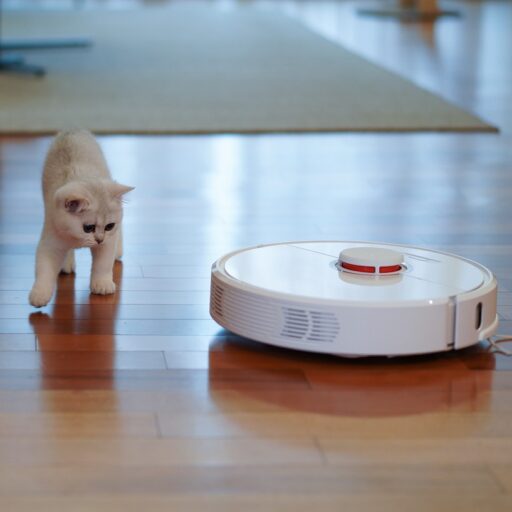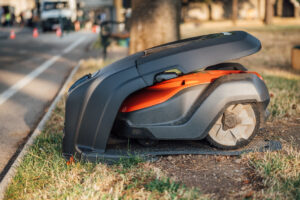Support our educational content for free when you purchase through links on our site. Learn more
Are Robot Mowers Worth the Money in 2023?
When it comes to maintaining a beautiful and well-manicured lawn, many homeowners opt for a robot mower as an alternative to traditional mowing methods. But the question remains: Are robot mowers worth the money? Our team at Robot Instructions™ has thoroughly researched the topic to provide you with comprehensive information and expert advice.
Introduction
Robot mowers have gained popularity in recent years for their efficiency, convenience, and potential time-saving benefits. However, investing in a robot mower is a significant decision, and it's essential to weigh the pros and cons before making the leap. In this article, we'll explore the factors to consider when deciding if a robot mower is a worthwhile investment.
Table of Contents
- How Do Robot Lawn Mowers Work?
- Are Robot Lawn Mowers Expensive?
- Can a Robot Lawn Mower Handle My Lawn?
- Pros and Cons of Robot Mowers
- FAQ
- Quick Tips and Facts
- Useful Links
- Reference Links
How Do Robot Lawn Mowers Work?
Robot lawn mowers operate using an automated system that cuts the grass autonomously. They are equipped with sensors and intelligent algorithms to navigate the lawn and mow in a predetermined pattern, often referred to as a "random" cutting style. These sensors detect obstacles such as trees, flower beds, or fences, allowing the robot mower to change direction and avoid collisions.
Some advanced models even have GPS capabilities, allowing them to map and navigate the lawn more efficiently. These mowers typically employ boundary wires to define the cutting area and prevent the mower from wandering into unwanted areas. The robot mower works silently and can operate day or night, providing a hassle-free mowing experience.
Key Features of Robot Lawn Mowers:
- Autonomous operation
- Intelligent navigation systems
- Boundary wire or GPS guidance
- Sensor technology to avoid obstacles
- Quiet operation
- Programmable schedules
Are Robot Lawn Mowers Expensive?
The cost of a robot lawn mower can vary depending on the brand, features, and capabilities. While robot mowers do require an upfront investment, they can potentially save you time and effort in the long run.
When comparing the cost of a robot mower with a traditional push mower, it's crucial to consider the value proposition of a robot mower's convenience and time-saving benefits. While the initial purchase price may be higher for a robot mower, the long-term savings in terms of labor and maintenance costs can outweigh the initial investment.
Pros of Robot Lawn Mower Cost:
- Potential time and labor savings
- Reduction in fuel and maintenance costs
- More consistent and even mowing results
- Increased property value
Cons of Robot Lawn Mower Cost:
- Higher initial investment
- Potential repair or replacement costs
- Complexity of setup and installation
Can a Robot Lawn Mower Handle My Lawn?
One common concern when considering a robot mower is whether it can handle the complexity and size of your lawn. Robot mowers come in various sizes and have different cutting widths and capabilities. It's essential to evaluate your lawn's size, slope, and other features to determine if a robot mower is suitable for your specific needs.
Most robot mowers are designed to handle lawns of moderate size, typically up to one acre. However, some models can handle larger areas, while others are better suited for smaller yards. Be sure to check the specifications and cutting capacity of the robot mower you are considering to ensure it can handle your lawn size.
Take into account any potential obstacles such as trees, slopes, or complex landscaping features. While robot mowers are designed to navigate around these obstacles, challenging terrain or extreme slope angles may limit their effectiveness.
Pros of Robot Mower Capability:
- Efficient and even mowing
- Adaptability to different lawn sizes and shapes
- Ability to handle obstacles and complex landscapes
- Potential for customization and scheduling
Cons of Robot Mower Capability:
- Limitations on steep or challenging terrain
- Potential navigation issues in complex yards
- Adjustments required for changing weather conditions
Pros and Cons of Robot Mowers
To help you make an informed decision, let's summarize the key pros and cons of robot mowers:
| Pros of Robot Mowers | Cons of Robot Mowers |
|---|---|
| Convenience | Initial Cost |
| Time Savings | Potential Repairs |
| Efficiency in Mowing | Complex Setup |
| Quiet Operation | Limitations in Complex Yards |
| Potential Cost Savings | Limitations on Challenging Terrains |
It's important to consider these factors and evaluate them in relation to your specific needs and preferences when deciding if a robot mower is worth the investment.
FAQ
Do Robot Lawn Mowers Really Work?
Yes, robot lawn mowers are capable of effectively mowing your lawn. With advances in sensor technology, navigation systems, and cutting patterns, robot mowers can efficiently maintain your lawn's appearance. However, it's crucial to choose a model suitable for your lawn's size and complexity.
How Long Do Robotic Lawn Mowers Last?
The lifespan of a robot lawn mower can vary depending on the brand, usage, and maintenance. Generally, a well-maintained robot mower can last around 7 to 10 years. Regular cleaning, blade maintenance, and proper storage during the off-season can extend the lifespan of your robot mower.
How Long Does It Take a Robotic Mower to Mow an Acre?
The mowing time for an acre-size lawn will depend on the specific model and features of the robot mower. On average, a robot mower can take anywhere from 2 to 4 hours to mow an acre. However, advanced models with a larger cutting width or faster navigation systems may complete the task in a shorter time.
Quick Tips and Facts
- Always consider the size and complexity of your lawn before investing in a robot mower.
- Regularly maintain and clean your robot mower to ensure optimal performance and longevity.
- Check if the robot mower comes with a warranty or service plan for added peace of mind.
- Some models offer additional features like app control, rain sensors, and smart integration.
- Take advantage of the customizable scheduling feature to set the ideal mowing times.
Useful Links
- Robot Instructions™ Website
- Amazon Robot Mower Category
- Walmart Robot Mower Category
- Etsy Robot Mower Category
- YouTube: Pros and Cons of Robot Lawn Mowers
- News Article: The Rise of Robotic Lawn Mowers
Reference Links
- Source 1: How Does a Robot Lawn Mower Work?
- Source 2: Are Robot Lawn Mowers Worth the Money?
- Source 3: Robotic Mowers: Pros and Cons
At Robot Instructions™, we believe that robot mowers can be an excellent investment for maintaining a beautiful lawn. While they require an upfront investment, the time and effort saved make them a worthwhile consideration. Assess your specific needs, evaluate the features and capabilities of different models, and make an informed decision based on your preference, budget, and lawn requirements. Happy mowing!





